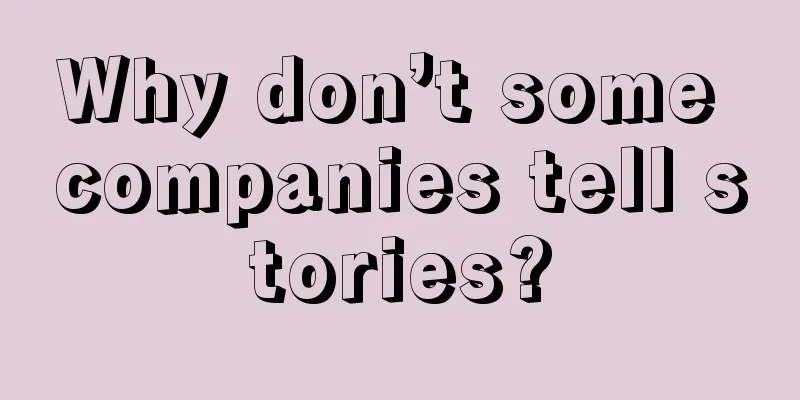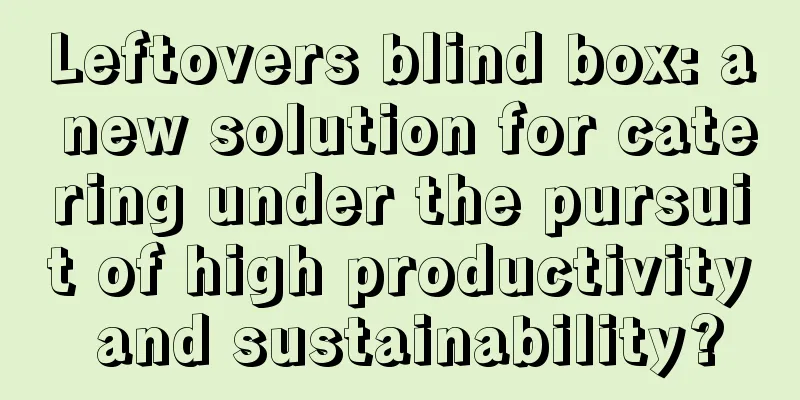Why don’t some companies tell stories?

"Most companies that can't tell stories don't lack the storytelling skills, but rather lack the ability to flexibly switch between rationality and emotion." 01 The story of that summer 28 years agoWhen I was in junior high school, the TV series "The Legend of the New White Snake" was on the air. Only two episodes were broadcast every day at noon. Just before the finale, they generously changed it to broadcast three episodes in a row at noon. This really made me anxious, because I ran home during lunch break to watch the show while eating, and when the third episode was airing, my afternoon class was about to start. I couldn't miss that episode! After all, Xu Xian was coming back, and after many years, Xu Xian and White Snake were going to meet! I was so excited, so excited, afternoon classes were nothing! I decided to skip classes and watch this last episode even if I had to take the risk of being punished. As a result, I was disappointed for many years: after Xu Xian came out of the temple after years of seclusion and cultivation, he was not excited and even a little cold when he saw Bai Niangzi! You know, when they were forcibly separated by Fahai, it was heartbreaking and unstoppable! Why did Xu Xian come out again and see Bai Niangzi, and he was so cold and indifferent as if she were a stranger? Xu Xian, you have changed... I was so sad that summer and couldn't figure out what was going on. Many years later, as I grew older and gained more experience, I came to understand more and more that the loneliness and restraint of "after so many years, the good times and beautiful scenery are gone" is a normal human emotion. But for me, a junior high school student at the time, it was simply a strong emotional tsunami. You see, I have remembered such a small thing for so many years. As I grew up, entered society, and engaged in more systematic and rational investment and management consulting work, I gradually became more and more restrained, paying less attention to emotions and more attention to reason, less attention to attitude and more attention to logic. The matter of Xu Xian has become a distant memory. Are there any other people, things or brands that can leave such a deep impression in our minds after so many years? 02 Rationality suppresses the ability to tell storiesThe older we get, the more thoughtful and rational we become, but the worse our storytelling skills seem to be. Storytelling requires attitude, plot, and emotion. I support what I oppose, I like what I hate. I remember what details, I tell what plots. I am as happy as a puppy, and as depressed as a deflated ball. After all, being well-balanced and watertight is suitable for reasoning, but not for telling stories. People who are good at telling stories have a willful attitude of "I don't care if it's powerful, correct, or good, this is what I think." People who love to listen to stories, on the other hand, have a partial attitude of "I don't care if you are powerful, correct, or good, I just appreciate you for what you are." It seems that only such irrational combinations can produce the wonderful chemical reaction called "preference", and only this reaction can ultimately catalyze the formation of so-called "fans" and "brands". The public loves to listen to stories because they are all flesh and blood people. However, companies are now suppressing their ability to "tell stories", especially after the emergence of platforms. They hope to promote themselves with the help of platform traffic and hope to be favored by the platform's algorithms rather than the audience's minds. Therefore, most companies are busy showing off their muscles, demonstrating their capabilities, explaining the benefits, and making the truth clear. They say very "correct" things and show their advantages and highlights. But it is getting harder and harder to leave an impression. It feels like: Yes, you are right, you are powerful, and you are useful. But I can't sense you. "You are right, but you are wrong." Once people start to be rational, they tend to emphasize "ability, interests, and reason", but once they start to be emotional, they tend to move towards "attitude, plot, and emotion". The big shots always say: No one who runs a business relies on attitude, plot, and emotion to succeed. Most people are restrained and tolerant, rational and clear-headed. This attitude is completely fine for running a business, but it is a bit awkward for building a brand. Why? Because your brand acts like a correct machine, not like a warm “person”. 03 Run a business rationally and build a brand emotionallyWhat rational entrepreneurs hate to hear the most is probably the word "affectionate", and what they hate to invest time, money and energy in the most is actions like "useless". They always talk about "ROI" and pursue "efficiency". If there is no concrete and clear meaning, they don't need to do it. Of course, it is efficient to do so. Especially entrepreneurs who are engaged in technology, software, and ToB enterprise service products are absolutely rational. Seeing through the essence at a glance, the insight goes straight to the bone. Therefore, the business is well-organized. Even when doing marketing and branding, they are masters at calculating traffic. As long as everything is a math problem, it can be solved easily. However, this is not the "methodology" to follow when it comes to branding and storytelling. Brand is the confidence and impression others have on you. In addition to showing that you are powerful, professional, useful, and reasonable, the most important thing is to establish an "emotional connection" with others. What is the fastest way to establish a connection? Stories. Some people misunderstand "storytelling" as "deception", while others think it is too childish. What I want to explain here is that "narrative is more powerful than abstract expression". Attitude, plot and emotion are easier to connect with people. No one needs to buy an "artificial intelligence 3D stereoscopic vision security surveillance camera", but some people may find that "a piece of snow-white A4 paper suddenly appears on a snow-white table, just one step away, and the human eye cannot notice it, but a fun machine will alarm because there is an extra 0.01 mm thickness there." Such a gadget may be worth buying and installing for a try. No one remembers what the “granules rich in DHA, lecithin and other effective elements” were, but everyone will remember the little boy licking the bowl in the song “Black sesame paste~When I was a child I heard the cries of sesame paste being sold”. Why do some companies feel that they “don’t have enough stories” or “the stories they have are not told well”? Most companies that are not good at storytelling do not really lack storytelling skills, but lack the ability to flexibly switch between rationality and emotion. There is no company without stories in the world, it just depends on whether there is a habit of recording and exaggerating these stories. Some bosses are very rational, and when they are extremely rational, the entire culture will not pay much attention to these "virtual" things, and everyone will naturally turn a blind eye to the so-called "stories" related to plots, emotions, and attitudes. Entrepreneurs with a background in science and engineering, especially male entrepreneurs, are even more so. They are not very comfortable switching to the emotional line, firstly because they feel it is "impractical" and "a waste of time", secondly because they are "embarrassed", and thirdly because they "subconsciously resist". As a result, the brands they create are very rational from sales talk to product language to communication content, lacking the ability to connect with people, making people feel "unreal", "not fun", and "not close". Some companies are aware of these problems, so they put a lot of effort into aesthetics and design content, but they still appear to be very rational and lack attitude. Some people would say that Apple is a very restrained and rational company, and is still a very good brand. Please note: Apple is expressing its "I am very rational and extreme" attitude in a very emotional way, while Jobs is full of paranoia and sensibility, and his personality label is extremely strong. 04. Truly show your attitude and emotionsOne of the things we have been studying is how to help companies stimulate brand narrative capabilities while being absolutely rational, and help build narrative frameworks and topics to guide attitudes, propositions and emotions. This is not easy, but I know it is very valuable, especially for so many serious companies. There are some fogs here: when aesthetics, design, and cultural content are done, does it mean that we have switched to emotional and storytelling thinking? Not yet! Some aesthetics, designs, and content are merely formal and emotional. They do not represent attitudes, plots, or emotions in essence. When companies tell stories about their brands, an important step to switch is to be more emotional in matters related to the brand. Use your rational brain less and your emotional brain more. We cannot just know what is right when we grow up, but forget what is "right". Right is a kind of "just right", a kind of "I want it this way", a kind of "shining light of humanity". It has nothing to do with efficiency, profit, rules, strength, elite, or self-confidence. It is just a kind of "attractive" trait. If the clear and steady performance of the host of a serious program is called "correct", then the moments when the young people in the talk show "U Can U Bibi" laugh out loud and are filled with indignation may be the shining "rightness". Only with attitude, plot and emotion can I know you, understand you, know you, like you and prefer you. |
<<: New tea drinks in 2024: not focusing on products, but focusing on peripherals
>>: Snack shops are fighting a price war to snatch franchisees.
Recommend
How to quickly register on shein? Registration review process
With the rise of cross-border e-commerce, Shein ha...
What are the steps for refunding Amazon deposit? How to open a store?
When some sellers decide not to continue operating...
How to operate an e-commerce business without supply from Amazon? How to register and open a store on Amazon?
As a world-renowned e-commerce platform, Amazon pr...
It’s really cool to use DeepSeek to make Xiaohongshu
In today's era of rapid development of social ...
Keep Medal's "Love Business"
Run for a Keep medal to prove your love to her. So...
Why does marketing to women always fail?
The discussion about feminism has become increasin...
How to promote orders through short video sales?
Is it still possible to start a short video busine...
Is it easy to do business on eBay in Australia? What are the advantages?
Now the cross-border e-commerce platform is develo...
Question Lei Jun, understand Lei Jun, and become Lei Jun
Lei Jun's fans on Douyin have skyrocketed, cre...
What are the fees for individual cross-border e-commerce? How can individuals do cross-border e-commerce?
With the rapid development of cross-border e-comme...
Three years later, how is "making friends" doing?
How is the "Make Friends" team, once the...
New tea drinks are collectively "lighter", and we see the formula for future milk tea hits
As consumer demands change, competition in the new...
How to get an Amazon bank statement? Where to get it?
If Amazon merchants need to verify their bank acco...
5 million for an advertising slogan
Advertising slogans are a very important part of b...
The golden rule of KOL marketing: How to create multi-platform breakthrough communication?
How to achieve accurate communication on multiple ...









